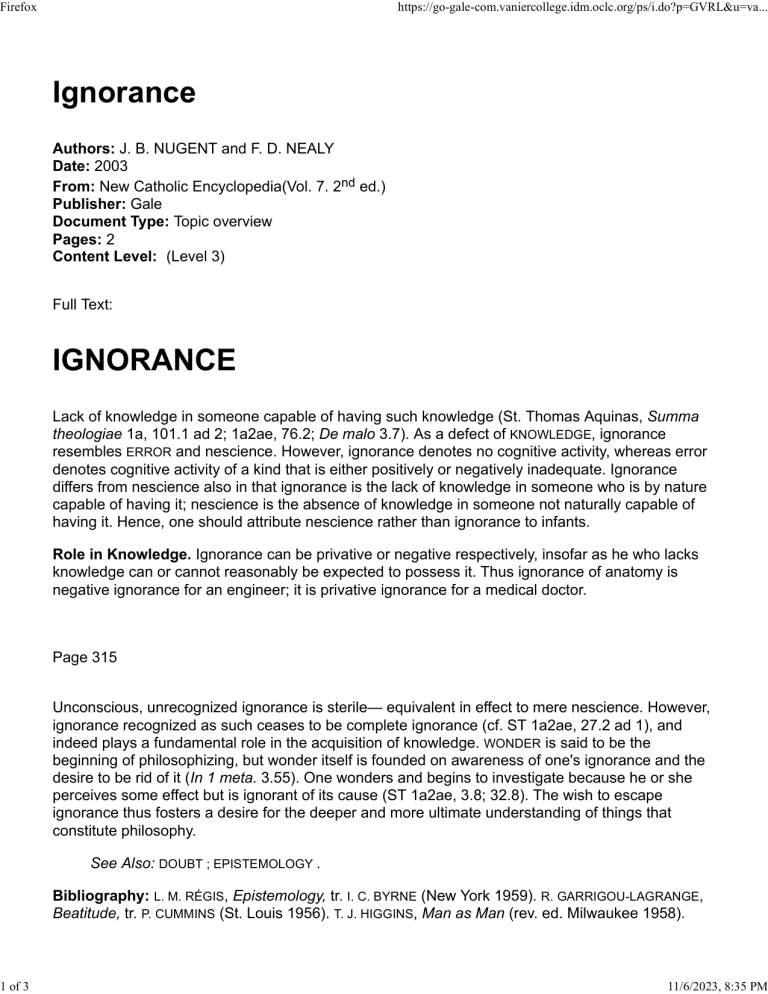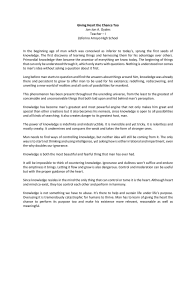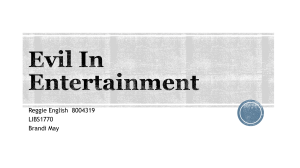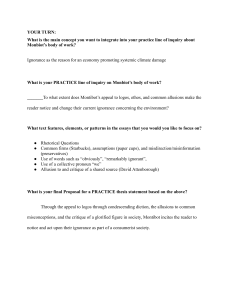
Firefox 1 of 3 https://go-gale-com.vaniercollege.idm.oclc.org/ps/i.do?p=GVRL&u=va... Ignorance Authors: J. B. NUGENT and F. D. NEALY Date: 2003 From: New Catholic Encyclopedia(Vol. 7. 2nd ed.) Publisher: Gale Document Type: Topic overview Pages: 2 Content Level: (Level 3) Full Text: IGNORANCE Lack of knowledge in someone capable of having such knowledge (St. Thomas Aquinas, Summa theologiae 1a, 101.1 ad 2; 1a2ae, 76.2; De malo 3.7). As a defect of KNOWLEDGE, ignorance resembles ERROR and nescience. However, ignorance denotes no cognitive activity, whereas error denotes cognitive activity of a kind that is either positively or negatively inadequate. Ignorance differs from nescience also in that ignorance is the lack of knowledge in someone who is by nature capable of having it; nescience is the absence of knowledge in someone not naturally capable of having it. Hence, one should attribute nescience rather than ignorance to infants. Role in Knowledge. Ignorance can be privative or negative respectively, insofar as he who lacks knowledge can or cannot reasonably be expected to possess it. Thus ignorance of anatomy is negative ignorance for an engineer; it is privative ignorance for a medical doctor. Page 315 Unconscious, unrecognized ignorance is sterile— equivalent in effect to mere nescience. However, ignorance recognized as such ceases to be complete ignorance (cf. ST 1a2ae, 27.2 ad 1), and indeed plays a fundamental role in the acquisition of knowledge. WONDER is said to be the beginning of philosophizing, but wonder itself is founded on awareness of one's ignorance and the desire to be rid of it (In 1 meta. 3.55). One wonders and begins to investigate because he or she perceives some effect but is ignorant of its cause (ST 1a2ae, 3.8; 32.8). The wish to escape ignorance thus fosters a desire for the deeper and more ultimate understanding of things that constitute philosophy. See Also: DOUBT ; EPISTEMOLOGY . Bibliography: L. M. RÉGIS, Epistemology, tr. I. C. BYRNE (New York 1959). R. GARRIGOU-LAGRANGE, Beatitude, tr. P. CUMMINS (St. Louis 1956). T. J. HIGGINS, Man as Man (rev. ed. Milwaukee 1958). 11/6/2023, 8:35 PM Firefox 2 of 3 https://go-gale-com.vaniercollege.idm.oclc.org/ps/i.do?p=GVRL&u=va... [J. B. NUGENT] Moral Aspect. As it affects the morality of an action, ignorance can be defined as the lack of knowledge in a person with regard to the nature or moral quality of an act he or she is performing or proposes to perform. Ignorance may be viewed under different aspects. As to its object or subject matter, it may be ignorance of law (ignorantia iuris) or ignorance of fact (ignorantia facti); that is, an agent may be ignorant of the existence of a law covering the matter in hand, or of the extension of the law to it; or he may be ignorant of some circumstance or condition of his action which would cause it to fall under a law that is known to exist. Of more importance, however, is the distinction made on the basis of the subject's accountability for the ignorance. Ignorance is said to be invincible when it cannot be dispelled by the reasonable diligence a prudent man would be expected to exercise in a given situation— and situations vary according to circumstances of persons, places, etc. In the case of invincible ignorance, the agent is inculpably unaware of the nature of a situation or of the obligations it involves. Ignorance of this kind excuses from moral fault. It causes the act to be involuntary, at least as far as its objective moral character is concerned. What is unknown cannot be the object of volition. Vincible ignorance, on the other hand, is that which could be dispelled by the application of reasonable diligence. Because the agent culpably neglects to make the effort necessary to become better informed, his ignorance is, in one degree or another, voluntary and imputable. The degree of imputability is measured by the extent of the agent's culpable negligence. Authors distinguish between simply vincible ignorance, which exists when some, but insufficient, effort is made to be rid of it, and crass or supine ignorance, in which very little effort, if any at all, is made to dispel it. Ignorance is said to be affected or a studied ignorance when it is directly voluntary; a person prefers to remain in ignorance so as to be free from a sense of obligation. A wrong done out of simply vincible ignorance, or even of crass ignorance, is less imputable than if it were done with full knowledge, for the act is less voluntary. Since affected ignorance is a species of vincible ignorance, directly willed and positively fostered, what is done through it remains entirely voluntary. This is a hypocritical type of ignorance and leaves the voluntariness of one's action almost untouched. It may indicate a certain respect for law that one should prefer to act without the consciousness that he is violating the law, and from that point of view, an act committed through affected ignorance is not quite as voluntary as the same act committed with full knowledge; however, this consideration is of small moment and the lessening of voluntariness in such a case is so slight as to be negligible. St. Thomas distinguished between antecedent, consequent, and concomitant ignorance. His "antecedent" ignorance corresponds so closely with the "invincible" ignorance described above that it needs no special discussion here; the same is true of his "consequent" ignorance, which corresponds with what is today more commonly called "vincible" ignorance. His "concomitant" ignorance is that of an agent who does something he is not aware he is doing, and who yet would be quite willing to do the same thing even if he were not ignorant. For example, a man unwittingly insults another person whom he happens to dislike and would be only too happy to insult if an occasion presented itself. His act is not involuntary in the sense that it is opposed to his will; neither is it voluntary in this particular case because he does not know what he is doing. He acts, therefore, with ignorance but not out of ignorance. St. Thomas describes such an act as nonvoluntary. The external act is not imputable to the agent, but he is not free of fault because of his habitual malicious disposition toward his neighbor. 11/6/2023, 8:35 PM Firefox 3 of 3 https://go-gale-com.vaniercollege.idm.oclc.org/ps/i.do?p=GVRL&u=va... See Also: HUMAN ACT ; VOLUNTARITY . Bibliography: THOMAS AQUINAS, Summa theologiae, 1a 2ae, 6.8; 19.6; 76. B. H. MERKELBACH, Summa theologiae moralis, ed. P. L. GAUDÉ, 3 v. (Paris 1938) 1:80–83. H. NOLDIN, Summa theologiae moralis, ed. A. SCHMITT, 3 v. (Barcelona 1945) 1:48–50. H. DAVIS, Moral and Pastoral Theology, 4 v. (3d ed. New York 1938) 1:16–19. E. MANGENOT, Dictionnaire de théologie catholique, ed. A. VACANT et al., 15 v. (Paris 1903–50) 7.1:734–740. [F. D. NEALY] Full Text: COPYRIGHT 2003 Gale, COPYRIGHT 2006 Gale, COPYRIGHT 2007 Gale, Cengage Learning Source Citation (MLA 9th Edition) NUGENT, J. B., and F. D. NEALY. "Ignorance." New Catholic Encyclopedia, 2nd ed., vol. 7, Gale, 2003, pp. 314-315. Gale eBooks, link.gale.com/apps/doc/CX3407705559/GVRL?u=vaniercol& sid=bookmark-GVRL&xid=a1367946. Accessed 6 Nov. 2023. Gale Document Number: GALE|CX3407705559 11/6/2023, 8:35 PM




